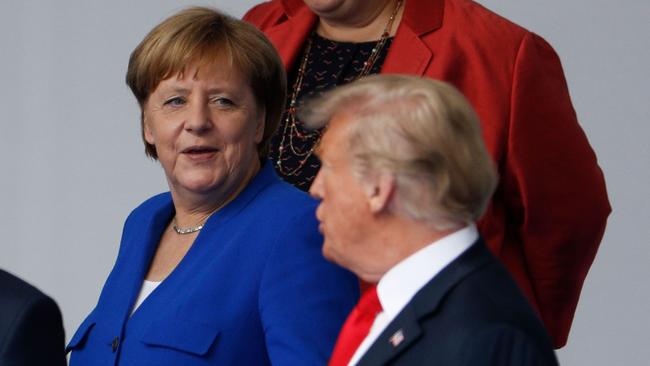What if Trump is right about Germany?
WHILE many are writing off his frank words of warning, there’s far more than meets the eye to President Trump’s brusqueness about Germany, writes James Morrow.
Rendezview
Don't miss out on the headlines from Rendezview. Followed categories will be added to My News.
THE news from NATO is, we are told, all bad.
Donald Trump is on the loose, insulting friends, and buddying up to enemies — and in the process wrecking an alliance structure that has held the West together since World War II.
One commentator called Trump’s performance in Germany “Orwellian”.
A senior European diplomat went further, saying “Trump’s performance was beyond belief”.
So what exactly did Trump say to get everyone so off side?
Well, Trump declared that Germany’s energy policy makes it a “captive of Russia”.
And that by skimping on its military spending, Berlin has become a “delinquent” free-riding on the good graces of the American taxpayer.
None of this was polite, to be sure.
But by now people should be used to Trump’s brusque salesman’s style in which the closeness of old allies is seen as license to speak with a sometimes incautious frankness (much like in a loud but close family), while enemies like Kim Jong-un are enticed to come to the table and (hopefully) sign a deal.
The more important question is, was he right?
In a word, yes. You can find fault with the specific data points Trump cites: He got his figures wrong on how much of NATO’s budget is picked up by Washington, for example (it’s closer to two-thirds than Trump’s 90 per cent).
But on any honest look at the question, Germany has some serious explaining to do.

SEBASTIAN GORKA DISCUSSES TRUMP’S EURO TOUR:
On all three major questions of our time, energy, defence, and immigration, Germany has for at least a decade been making moves that whether by accident or design play straight in to Moscow’s hands.
Since 2000, Germany has embarked on a slow phase-out of its nuclear power plants.
The initiative was started by then-Chancellor Gerhard Schroeder, who would later go on to become Vladimir Putin’s chief European lobbyist. Angela Merkel has continued the program, with the result being higher energy bills, reliance on intermittent renewables (sound familiar) and increased dependence on Russian pipelines for natural gas.
This gives Russia’s otherwise crummy economy a major shot of foreign currency — and easy leverage over policymakers in Berlin and across Europe.
Likewise, when it comes to spending on defence, Germany has been a laggard, spending just a fraction of NATO’s agreed two per cent on the military.
While historically the thought of an armed and bellicose Germany alarmed the world, with an expansive Russia knocking at Europe’s door the danger is just the opposite.
Today much of Germany’s air force is grounded due to lack of parts and maintenance, and this week it was reported that German troops on an exercise had to use broomsticks instead of rifles.
Again, if this is good news to anyone, it is to Vladimir Putin.
Finally, immigration.
If you wanted to come up with a way to divide Europe and drive its voters to the right you would be hard pressed to beat Angela Merkel’s 2015 “we can do it!” pledge, which led to hundreds of thousands of migrants pouring into Germany and its neighbours. Ordinary Europeans, while not unwilling to help, rightly felt that their suburbs were being treated as lifeboats to park problems not of their making by politicians mouthing slogans about “welcome”.
This is not to suggest that Angela Merkel is somehow a cat’s paw of Russia.
But the problem for the West is two-fold. On the one hand an exposed, expansionist Russia relies on exactly this sort of division and squabbling in the West to allow it to pursue its own aims and feed its paranoias.
On the other, false fronts of unity have hidden the rot behind any number of institutions no one had dared, until now.
Trump is right to call out Germany and other nations who do not pull their weight. The right response is not to blame Trump for pointing this out, but rather to pull together and rebuild institutions that have squandered their trust.
James Morrow is opinion editor of The Daily Telegraph.



